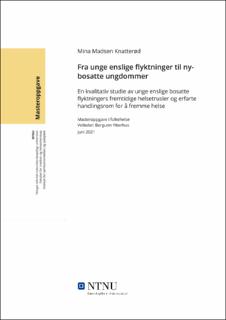Fra unge enslige flyktninger til ny-bosatte ungdommer - En kvalitativ studie av unge enslige bosatte flyktningers fremtidige helsetrusler og erfarte handlingsrom for å fremme helse
Abstract
Denne masterstudien er en del av prosjektet Taus Tids Tale – En studie av helsefremming og tjenesteutforming for unge enslige bosatte flykninger, som er et samarbeid mellom NTNU og Trondheim universitetskommune, Barne- og familietjenesten. Datamaterialet i masteroppgaven vil være en del av hovedprosjektet. Hensikten med denne masterstudien var å studere unge enslige bosatte flyktningers erfaringer i hverdagen for å få tak i deres fremtidige helsetrusler og hvilket handlingsrom de har for å fremme egen helse. Problemstillingen er følgende: Hva i de bosatte unge enslige flyktningers biografiske fortellinger signaliserer trusler mot deres helse fremover, og hva slags handlingsrom erfarer de å ha som kan fremme deres helse? Datamaterialet har blitt hentet gjennom individuelle semi-strukturerte intervju. Elleve unge enslige bosatte flyktninger i alderen 18-25 år fra tre kommuner, hvorav to med innbyggertall mellom 6000 og 10 000 og en kommune med over 200 000 ble intervjuet.
Mye av foreliggende forskning handler om enslige mindreårige flyktninger i asylsøkerfasen og i asylmottak. Det eksisterer lite review-basert forskning som særskilt tar utgangspunkt i unge enslige bosatte flyktninger. Det er derfor behov for mer forskning på denne gruppen. Teori som blir benyttet i oppgaven er ‘salutogenese’ med begrepet ‘sence of coherence’ og ‘the capabilities approach’ inklusive ‘agency’. Fortolkende fenomenologi blir benyttet som analyseringsmetode.
Denne studiens hovedfunn viste at ungdommene møtte flere helsetrusler i hverdagen. De opplevde språkutfordringer som begrenset muligheter for utdanning, arbeid, sosialisering og etablering av vennskap. Ungdommene hadde lite og skjøre nettverk i Norge, med få gode venner. Flere opplevde ensomhet og isolasjon. Mange hadde bekymringer for familien og strevde med søvn, noe som gikk ut over skolegang og hverdag. Det norske klimaet og covid-19-pandemien viste seg å ha en påvirkende kraft på helsetruslene. Imidlertid brukte ungdommene handlingsrommet sitt i møte med disse helsetruslene. De hadde store faglige ambisjoner, jobbet hardt både på skolen og på jobb. Ungdommene viste høy grad av selvstendighet og var flinke til å benytte tilgjengelige handlingsrom, som det lille nettverket de hadde eller bofelleskap. De mente selv at de forstod situasjonen tilstrekkelig til å kunne håndtere hverdagslivet på en akseptabel måte. Allikevel var det ikke alltid like lett å finne mening i alle strukturene i det norske samfunn. Samfunnets kombinerte capabilities trenger ytterligere utbedringer gjennom mer skreddersydde løsninger rundt ungdommene. This Master’s Thesis is part of the project ‘Taus Tids Tale – a study of health promoting and service solutions for young, unaccompanied, resident refugees, which is a collaborations between NTNU and Trondheim local authority’s Children and Family Services. The dataset for this Master’s Thesis was collected as part of the main project. The purpose of the thesis was to study the everyday experience of young, unaccompanied, resident refugees’ in order to identify the future health risk factors and their own agency in promoting a healthy life. The objective of the study is to investigate the following: What factors in the young, unaccompanied, resident refugees biographical narratives may identify future health risk factors and what kinds of agency do they perceive to have to promote their own health? The dataset has been collected through individual semi-structures interviews. Eleven young, unaccompanied, resident refugees between 18 and 25 years old were interviewed, from three different local authorities, of which two have a population of between 6000 and 10 000 and one with a population of over 200 000.
Much of the existing research covering unaccompanied, under age refugees in the applications phase of their asylum process and in reception centres. There is little review-based research that specifically covers young, unaccompanied, resident refugees. This is why more focus is need for this group. The theoretical approach used for this thesis is ‘salutogenesis’ with the concepts ‘sense of coherence’ and ‘the capabilities approach’ including ‘agency’. Interpretive phenomenology is used as the methods of analysis.
The conclusion of the study established that the subjects had several challenges that constituted risk factors to their health in their everyday life. They experienced language challenges, which limited their options for education, work, socialising and establishing friendships. They had small and fragile networks in Norway, with only a few good friends. Several reported loneliness and isolations. Many were worried about family and experienced insomnia, which again effected their schooling and everyday activities. The Norwegian climate and the ongoing covid-19 pandemic where factors that contributed to increased risk factors. However, the young people actively used their agency when encountering the risks. They expressed significant academic and other ambitions, and worked hard, both at school and in their places of work. They showed a high degree of independence and were good at utilising their available resources, through their limited networks or shared housing communities. They expressed confidence that they had sufficient understanding of their surroundings to be able to handle their situations in an acceptable way. At the same time, it was not always easy for them to understand the purpose for all the structures in the Norwegian society. Further improvements, through more custom solutions, are needed to fully utilise their capabilities for the benefit of themselves and society.
